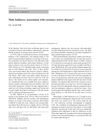 February 2019 in “Journal of Pakistan Association of Dermatology”
February 2019 in “Journal of Pakistan Association of Dermatology” Many men with male pattern baldness have abnormal blood fat levels, which may raise their risk of heart disease.
[object Object]  October 2016 in “Journal of the Dermatology Nurses’ Association”
October 2016 in “Journal of the Dermatology Nurses’ Association” Polycystic Ovary Syndrome (PCOS) affects 6%-15% of women of reproductive age, causing symptoms like acne and hair loss, and increasing the risk of type 2 diabetes and heart disease; it's managed through diet, exercise, and medications like Metformin and hormonal contraceptives.
 32 citations,
June 2019 in “Frontiers in Endocrinology”
32 citations,
June 2019 in “Frontiers in Endocrinology” Polycystic Ovary Syndrome (PCOS) is common in women with conditions like anovulation, hirsutism, hair loss, and type 2 diabetes, and it can lead to health risks like heart disease, obesity, insulin resistance, and depression. Non-Classic Congenital Adrenal Hyperplasia (NC-CAH) is also discussed.
 1 citations,
November 2001 in “Acc Current Journal Review”
1 citations,
November 2001 in “Acc Current Journal Review” Electron Beam Tomography (EBT) is a useful additional test to stress testing for detecting heart disease.
 35 citations,
May 2015 in “Thrombosis Research”
35 citations,
May 2015 in “Thrombosis Research” Prostaglandin E2 affects human platelet activity in complex ways that could lead to personalized heart disease treatments.
 3 citations,
August 2017 in “International journal of reproduction, contraception, obstetrics and gynecology”
3 citations,
August 2017 in “International journal of reproduction, contraception, obstetrics and gynecology” People with PCOS have higher levels of PAI-1, which may increase their risk of heart disease and fertility issues.
 November 2018 in “International Journal of Current Pharmaceutical Research”
November 2018 in “International Journal of Current Pharmaceutical Research” PCOS is a hormonal disorder causing symptoms like irregular periods and acne, and increases the risk of diabetes and heart disease.
 12 citations,
February 2022 in “International Journal of Clinical Practice”
12 citations,
February 2022 in “International Journal of Clinical Practice” Oxidative stress is higher in women with PCOS, especially if they're obese, and it may increase their risk of heart disease.
[object Object] 2 citations,
November 2020 in “Journal of Nepal Medical Association” PCOS is often linked with menstrual issues, hormonal imbalances, and a higher risk of heart disease and diabetes.

Self-monitoring blood pressure in pregnant women didn't improve outcomes, diabetes drugs may increase gallbladder disease risk, a new drug helps severe hair loss, a plant-based COVID-19 vaccine is 69.5% effective, and new anticoagulants are safer for diabetics with heart rhythm issues than warfarin.
September 2022 in “Dermatology and therapy” Androgenetic alopecia is linked to heart disease, metabolic issues, and mental health problems.
 38 citations,
February 2009 in “Journal of The European Academy of Dermatology and Venereology”
38 citations,
February 2009 in “Journal of The European Academy of Dermatology and Venereology” Severe vertex pattern hair loss may indicate a higher risk for artery plaque buildup.
 4025 citations,
December 2003 in “Human Reproduction”
4025 citations,
December 2003 in “Human Reproduction” The 2003 consensus updated PCOS diagnosis criteria and linked PCOS to higher risks of diabetes and heart problems, recommending lifestyle changes to lower these risks.

Early-onset baldness is linked to genetics, lifestyle, and can indicate higher risk for heart and metabolic diseases, and affects mental health.
 June 2018 in “Journal of evolution of medical and dental sciences”
June 2018 in “Journal of evolution of medical and dental sciences” Skin problems like excessive hair growth, acne, and dark skin patches can be signs of Polycystic Ovarian Disease, which may also be linked to family history and a risk for diabetes.
 January 2020 in “Asian Journal of Basic Science & Research”
January 2020 in “Asian Journal of Basic Science & Research” Nutrease powder, a high-protein, low-carb supplement, can help manage Polycystic Ovary Syndrome symptoms, regulate periods, improve ovulation, and restore fertility.
 October 2018 in “Journal of Clinical Research in Pediatric Endocrinology”
October 2018 in “Journal of Clinical Research in Pediatric Endocrinology” Children with classic congenital adrenal hyperplasia have thicker heart fat and more heart and blood vessel risk factors, especially if their condition is not well-controlled.
 2 citations,
April 2023 in “Pharmaceuticals”
2 citations,
April 2023 in “Pharmaceuticals” Testosterone therapy for postmenopausal women appears safe and may protect against heart disease, but requires constant monitoring and more research for long-term effects.
 February 2020 in “İstanbul medical journal”
February 2020 in “İstanbul medical journal” Metformin improves early signs of heart disease in women with PCOS and raises apelin levels, but doesn't significantly change artery thickness.
 27 citations,
February 2020 in “Journal of Cardiovascular Translational Research”
27 citations,
February 2020 in “Journal of Cardiovascular Translational Research” Women generally handle heart enlargement better than men, but it's riskier for them if it occurs; hormones like estrogen offer some protection.
5 citations,
May 2014 in “Clinical and Experimental Dermatology” Mutations in the desmoplakin gene can cause hair problems and deadly heart disease.
December 2016 in “Asian Pacific journal of cancer biology” PCOS is a hereditary disorder that can lead to diabetes and heart disease if not treated early.
 12 citations,
July 2020 in “DOAJ (DOAJ: Directory of Open Access Journals)”
12 citations,
July 2020 in “DOAJ (DOAJ: Directory of Open Access Journals)” Men with hormonal imbalances similar to PCOS may have increased risk of metabolic and heart diseases.
 December 2021 in “Journal of oncology research reviews & reports”
December 2021 in “Journal of oncology research reviews & reports” Polycystic Ovary Syndrome (PCOS) can lead to diabetes, heart disease, cancer, and mental health problems.
 May 2024 in “Indian Journal of Dermatology”
May 2024 in “Indian Journal of Dermatology” Androgenetic alopecia in men is genetic and linked to health issues like obesity and heart disease, with treatments including minoxidil, finasteride, and hair transplants.
 17 citations,
November 2000 in “Journal of the American Pharmaceutical Association”
17 citations,
November 2000 in “Journal of the American Pharmaceutical Association” The document concludes that low-dose oral contraceptives and hormonal therapies can manage perimenopause symptoms and reduce some health risks, but lifestyle changes and disease screening are also important.

Male androgenetic alopecia (MAA) is a common, hereditary hair loss condition in men, linked to heart disease, and can be treated with minoxidil, finasteride, or hair transplantation.
 1 citations,
September 2023 in “Dermatology online journal”
1 citations,
September 2023 in “Dermatology online journal” Low dose oral minoxidil can help with hair growth but may cause serious heart problems, so doctors need to be careful.
 4 citations,
September 2018 in “Journal of Drug Delivery and Therapeutics”
4 citations,
September 2018 in “Journal of Drug Delivery and Therapeutics” PCOS is a common hormonal disorder in women linked to several health risks and can be managed through various treatments.
 3 citations,
April 2015 in “Netherlands Heart Journal”
3 citations,
April 2015 in “Netherlands Heart Journal” Male baldness is not significantly associated with coronary artery disease.


























